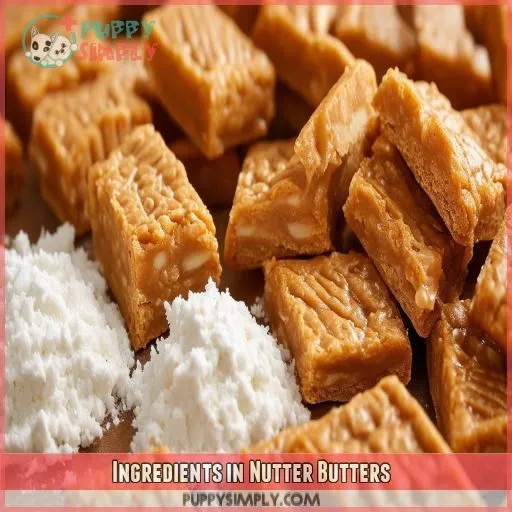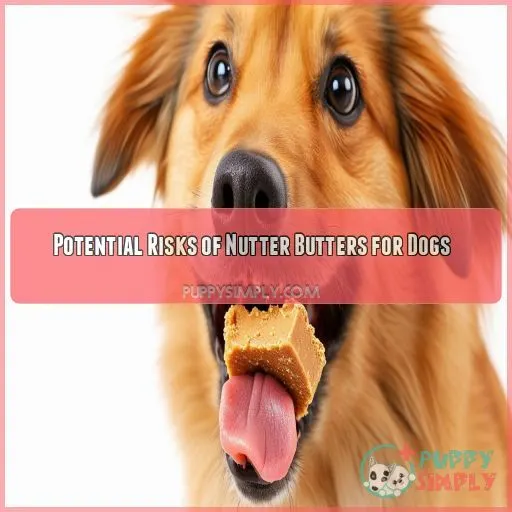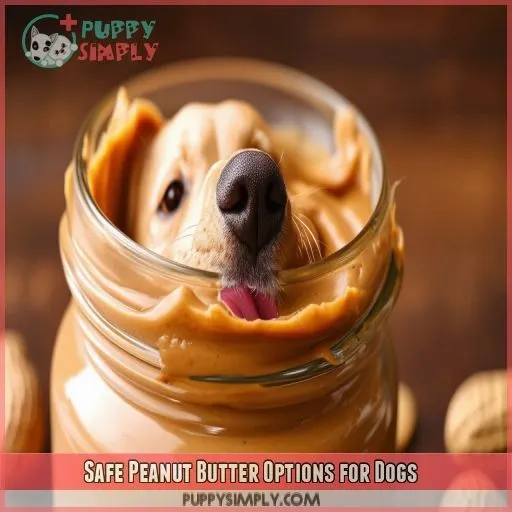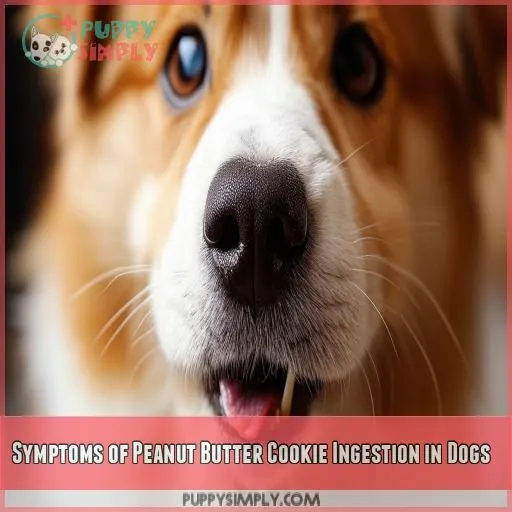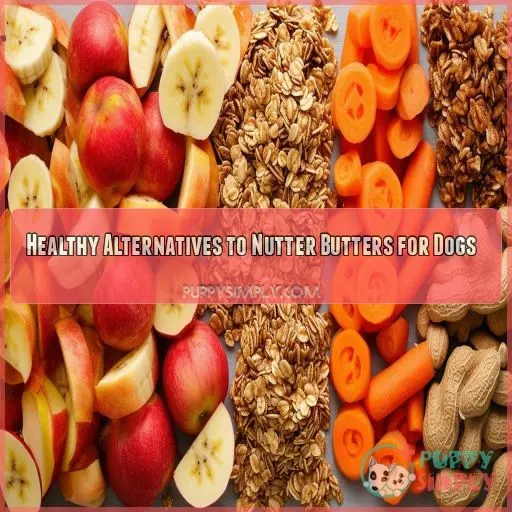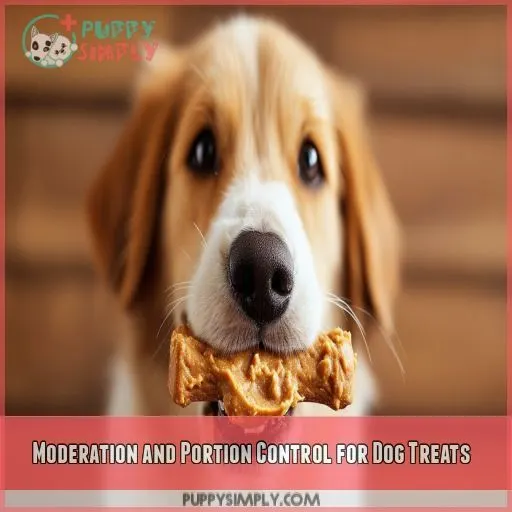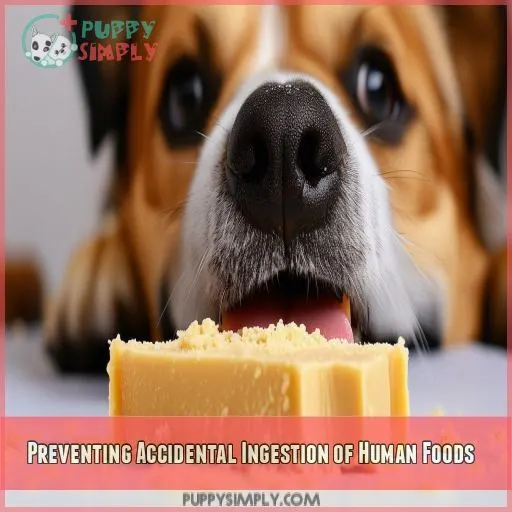This site is supported by our readers. We may earn a commission, at no cost to you, if you purchase through links.

Unfortunately, while certain peanut butters are safe for dogs, Nutter Butters contain not just peanut butter, but also sugar, sweeteners, fats, and oils which, if consumed, could lead to a world of yuck for your pooch.
If you still want to treat your dog with a peanutty snack, consider providing them with a spoonful of plain, xylitol-free peanut butter.
Table Of Contents
- Key Takeaways
- Can Dogs Eat Nutter Butters?
- Ingredients in Nutter Butters
- Potential Risks of Nutter Butters for Dogs
- Safe Peanut Butter Options for Dogs
- Symptoms of Peanut Butter Cookie Ingestion in Dogs
- When to Seek Veterinary Care
- Healthy Alternatives to Nutter Butters for Dogs
- Moderation and Portion Control for Dog Treats
- Preventing Accidental Ingestion of Human Foods
- Frequently Asked Questions (FAQs)
- Is Nutter Butter real peanut butter?
- Can dogs eat human peanut butter cookies?
- Can dogs eat peanuts?
- Can dogs eat peanut butter?
- Can dogs eat Nutter Butter?
- Is it advisable to stop eating butter?
- Is butter good for dogs?
- Why can’t dogs eat butter?
- Can dogs eat salted butter?
- Can you eat butter if your dog is overweight?
- Are Nutter Butters toxic to dogs?
- Are there any alternatives to Nutter Butters for dogs?
- What happens if my dog eats a lot of Nutter Butters?
- What should I do if my dog eats chocolate-covered Nutter Butters?
- How much is too much peanut butter for dogs?
- Conclusion
Key Takeaways
- For the sake of your furry friend, steer clear of Nutter Butters. Even though they’re not a death sentence for your pooch, they’re like a ticking time bomb for an upset tummy.
- Peanut butter can be a treat for your dog, but only if it’s the real deal, not the kind with added sugars and stuff that can make your dog sick.
- If you really want to spoil your pup with something peanutty, give them a tiny bit of plain peanut butter. But don’t go overboard, or you might end up with a butterball on your hands!
- Remember, Nutter Butters are for humans to enjoy, not for our beloved canine companions. So, keep them out of reach and opt for dog-friendly treats instead.
Can Dogs Eat Nutter Butters?
So, can dogs eat Nutter Butters? The concise answer is no—it’s best to exclude Nutter Butters from your dog’s treat rotation. While they’re not poisonous to dogs (unless they contain chocolate), Nutter Butters are highly processed and packed with sugar, artificial ingredients, and high fructose corn syrup.
Dogs’ digestive systems are more sensitive than humans’, and they can’t handle these ingredients in the same way we can. Indulging in Nutter Butters may lead to stomach upset, vomiting, diarrhea, and even weight gain for your furry friend. Not exactly a fun time for your pup!
It’s also important to be cautious about the type of peanut butter you give your dog. Many brands contain xylitol, an artificial sweetener that’s toxic to dogs. Always opt for natural, dog-safe peanut butter with no added sugars or preservatives.
If you’re looking for a tasty treat to share with your dog, there are plenty of dog-friendly options available. You can even try making your own! Just remember, regarding Nutter Butters, they’re best left for human enjoyment.
Ingredients in Nutter Butters
Let’s take a closer look at the ingredients in Nutter Butters to better understand their potential impact on your furry friend. These cookies contain peanut butter, sugar and sweeteners, and fats and oils, each of which poses unique considerations for canine consumption.
Peanut Butter
Peanut butter is a tasty treat for dogs, but not all peanut butter is created equal. The best option for your dog is unsalted, homemade, or dog-specific peanut butter, as it avoids the added sugar, salt, and other additives found in commercial brands.
Some commercial peanut butter brands contain xylitol, a sugar substitute that’s safe for humans but toxic to dogs, even in small amounts. Always check the label to verify the peanut butter is xylitol-free. Additionally, choose a brand with peanuts as the only ingredient, as chocolate and other additives can be harmful to dogs.
While peanut butter can be a good source of protein, vitamins, and healthy fats for your dog, it’s important to feed it in moderation due to its high-fat content. Too much peanut butter can lead to obesity and health issues like pancreatitis.
Sugar and Sweeteners
Nutter Butters contain sugar and other sweeteners like high fructose corn syrup and molasses. While these ingredients add to the taste, they can be concerning for dog owners. Here’s what you need to know:
- Sugar Content: Sugarcane molasses, in moderation, can be safe for dogs due to its retained nutrients like chromium, iron, calcium, magnesium, and vitamin B6. However, consult your vet first, especially if your dog has health conditions.
- High Fructose Corn Syrup (HFCS): While HFCS itself isn’t directly mentioned as toxic to dogs, it contributes to excessive sugar intake, which isn’t healthy.
- Sweeteners Toxicity: Avoid artificial sweeteners like xylitol, often found in "sugar-free" items. Xylitol is highly toxic and potentially fatal, causing seizures, liver failure, and even death in dogs.
- Palm Oil Composition: Pure palm oil is considered safe for dogs and has a better fatty acid composition than coconut oil, according to Harvard Health. However, large amounts of any oil can cause an upset stomach and diarrhea.
Fats and Oils
Now, let’s talk about the fats and oils in Nutter Butters.
While natural peanut butter is packed with healthy fats, Nutter Butters contain palm oil, which can increase bad cholesterol levels in humans.
Additionally, the high-calorie content in Nutter Butters can contribute to weight gain and obesity in dogs.
Potential Risks of Nutter Butters for Dogs
Nutter Butters pose several potential risks to dogs due to their ingredients. Here are the key concerns:
- Xylitol toxicity: Nutter Butters may contain xylitol, a sugar substitute that’s toxic to dogs and can lead to hypoglycemia, seizures, liver failure, or even death.
- Fat content: The high fat content in peanut butter and cookies can cause GI distress, such as tummy aches, vomiting, and diarrhea, and contribute to weight gain.
- High fructose corn syrup: This ingredient has been linked to increased liver fat and a higher risk of Type 2 diabetes in humans. While the direct impact on dogs is unclear, it suggests potential health risks.
- Molasses: While molasses offers some nutritional benefits, its high sugar content could still contribute to weight gain and dental issues if consumed in excess.
Safe Peanut Butter Options for Dogs
When considering safe peanut butter options for your dog, it’s essential to recognize that not all peanut butter is created equally. Here are some guidelines and recommendations to guarantee your furry companion enjoys this treat without risk:
- Essential Xylitol Risks: Xylitol, a sugar substitute commonly found in lower-sugar or sugar-free products, is extremely toxic to dogs. Always check the ingredient labels to verify the peanut butter you’re offering doesn’t contain xylitol. This applies to all brands, as xylitol is the only ingredient in peanut butter that’s harmful to dogs.
- Important Fat Content Concerns: Peanut butter is a high-fat treat, and overconsumption can lead to obesity and health issues like pancreatitis. It’s best to give peanut butter occasionally and in moderation. For small dogs, limit their intake to no more than half a tablespoon per day, while larger dogs shouldn’t exceed one tablespoon per day.
- Necessary Portion Control Guidelines: As a general rule, treats shouldn’t exceed 10% of your dog’s daily calorie intake. Consult your veterinarian for specific advice, especially if your dog has health conditions like diabetes or food sensitivities.
- Alternative Treat Options: If you’re unsure about the safety of store-bought peanut butter, consider making your own at home using a food processor and just peanuts. This ensures a healthy, additive-free treat for your dog. Additionally, you can explore dog-specific peanut butter brands, such as Poochie Butter, which may offer additional health benefits.
Symptoms of Peanut Butter Cookie Ingestion in Dogs
If your dog has eaten Nutter Butters, be aware of potential symptoms like increased thirst and stomach upset. Monitor your dog closely and seek veterinary care if vomiting persists, diarrhea occurs more than three times, or your dog refuses to eat breakfast.
Nutter Butters Impact on Dogs
Nutter Butters contain ingredients that can negatively impact your dog’s digestive system and overall health. Here are some potential symptoms to watch out for:
- Increased Thirst and Upset Stomach: The high sugar content in Nutter Butters can lead to increased thirst and gastrointestinal distress in dogs.
- Weight Gain: The cookies’ high fat and calorie content can contribute to unhealthy weight gain if consumed in excess.
- Allergic Reaction: Nutter Butters contain peanuts and wheat, which are common allergens for dogs.
- Aflatoxin Poisoning: Peanut butter can sometimes contain aflatoxin, a toxin produced by certain fungi. This can lead to liver disease and liver cancer.
If you suspect your dog has ingested a large amount of Nutter Butters or is displaying any concerning symptoms, it’s important to consult a veterinarian and potentially induce vomiting within 3.5 hours of ingestion.
Potential Toxins in Peanut Butter
Aflatoxin is a toxic metabolite produced by the Aspergillus fungus. It’s found in many tropical and subtropical countries where temperature and humidity conditions are ideal for mould growth and toxin production. Aflatoxin is a small, stable molecule that can’t be destroyed by heat treatment or during processing. It’s highly toxic and can cause disease in livestock and humans. Aflatoxin B1 is the most toxic and carcinogenic of the four main types.
Aflatoxin contamination is well above the maximum allowable regulatory limits for both local and international phytosanitary standards. Sixty percent of the raw peanut samples were contaminated with total aflatoxin ranging from
Signs of Distress
If your dog is experiencing an allergic reaction, you may notice swelling of the face, ears, lips, eyelids, or earflaps.
Other signs include:
- Chronic ear infections
- Gastrointestinal issues like vomiting and diarrhea
- Skin irritation such as itchy, red, inflamed, or scabbed skin
In more severe cases, dogs may exhibit anaphylactic shock, with a rapid drop in blood pressure.
Additionally, watch out for signs of high blood sugar, such as increased thirst and frequent urination, which could indicate pancreatitis or diabetes mellitus.
Dental issues can also arise, including:
- Bad breath
- Discomfort while chewing
- Excessive drooling
- Blood in the saliva
When to Seek Veterinary Care
As a pet owner, it’s essential to monitor your dog’s symptoms after they ingest Nutter Butters and decide when to seek veterinary care. While Nutter Butters aren’t toxic unless they’re chocolate-covered, they can still cause stomach upset and potential vomiting, nausea, diarrhea, and weight gain due to their high sugar content. Here’s when you should seek veterinary care:
- Vomiting or diarrhea persists: If your dog continues to vomit or experience diarrhea after consuming Nutter Butters, it’s best to consult your veterinarian. This could indicate a more serious reaction or an inability to process the high sugar content.
- Signs of lethargy: If your dog becomes lethargic and refuses to eat after consuming Nutter Butters, it’s critical to seek veterinary advice. This could be a sign of a more severe reaction or illness.
- Breakfast isn’t eaten: If your dog skips their next meal after eating Nutter Butters, it’s a cause for concern. Loss of appetite can indicate stomach distress or a more serious issue, so it’s best to consult your veterinarian.
Healthy Alternatives to Nutter Butters for Dogs
If you’re looking for healthier alternatives to Nutter Butters for your dog, here are some options to explore:
- Low-Fat Treats: Opt for treats with reduced fat content. While peanut butter is a popular treat for dogs, its high-fat content can contribute to weight gain and health issues like pancreatitis. Choose low-fat alternatives or limit the amount you give to your dog.
- Fiber-Rich Alternatives: Include treats that offer fiber and other nutrients. For example, chia seeds are a good source of fiber, protein, calcium, iron, and magnesium. Pumpkin seeds are another excellent option, as they’re a natural dewormer and rich in manganese, vitamin K, zinc, and phosphorus.
- Nut-Free Spreads: Consider nut-free alternatives like sunflower seed butter or pumpkin seed butter. These options provide similar nutritional benefits to nut butter but without the risk of nut allergies or high-fat content.
Moderation and Portion Control for Dog Treats
Treats are an essential part of positive reinforcement and rewards-based training. However, it’s important to practice portion control and make sure treats don’t exceed 10% of your dog’s daily calorie intake. For a 10-pound dog, this equates to about 20 calories from treats, while a 50-pound dog should have no more than 75 calories.
When selecting treats, opt for those with clear calorie information and feeding recommendations on the packaging. Choose treats that are proportional to your dog’s size to prevent choking hazards, and consider breaking larger biscuits into smaller pieces.
If you’re concerned about your dog’s calorie intake, use their regular food as rewards. You can also opt for low-calorie treats, such as certain fruits and vegetables like bananas, carrots, cucumber, apple, and green beans. Additionally, using treat-dispensing toys can help extend feeding time and provide mental stimulation for your dog.
Preventing Accidental Ingestion of Human Foods
Now that you’re aware of the risks associated with Nutter Butters and other human foods, it’s important to take steps to prevent accidental ingestion by your dog. Here are three key strategies to prevent such incidents:
- Safe storage: Keep all hazardous foods, such as chocolate, grapes, raisins, and products containing xylitol, in sealed containers or cabinets that your dog can’t access. This includes leftover meals, snacks, and any ingredients that may be harmful to them.
- Supervision: When cooking or dining, make sure your dog doesn’t snatch food from countertops or tables. If they’ve a habit of chewing on toys or other objects, provide those items under supervision only.
- Pet-proofing your home: This includes keeping the trash out of your dog’s reach, using pet-proof trash cans with secure lids, and storing medications, cleaning products, and other toxic substances in secure cabinets or high shelves.
Frequently Asked Questions (FAQs)
Is Nutter Butter real peanut butter?
Nutter Butters are like two peas in a pod with their peanut butter cousins—they’re made with real peanut butter. But, they’re no ordinary peanut butter sandwich cookies. They’re a sweet and salty treat with a crunchy texture and a creamy filling.
Can dogs eat human peanut butter cookies?
Dogs can eat peanut butter, but not all peanut butter cookies. Cookies made for humans often contain ingredients that are harmful to dogs, like added sugars and chocolate. Opt for dog-friendly recipes instead.
Can dogs eat peanuts?
Yes, dogs can eat peanuts—but only in small quantities and occasionally. Choose unsalted, unseasoned, dry-roasted, or raw peanuts without shells to avoid health risks.
Can dogs eat peanut butter?
Dogs can eat peanut butter, but only in moderation and as a treat. Avoid giving your dog peanut butter with xylitol, a sugar substitute toxic to dogs. Check the label and opt for dog-specific peanut butter or homemade varieties.
Can dogs eat Nutter Butter?
Nutter Butters are a tasty treat for humans, but they’re not suitable for your dog. While they’re not toxic, they’re packed with sugar, saturated fat, and artificial ingredients. These ingredients are hard for dogs to digest and can cause stomach upset, vomiting, and diarrhea.
Is it advisable to stop eating butter?
No, it’s not advisable to completely stop eating butter. While butter is high in saturated fat and calories, leading to potential weight gain and heart disease, it also contains beneficial nutrients like vitamins A, D, and E, as well as conjugated linoleic acid. The key is moderation.
Is butter good for dogs?
While butter isn’t toxic to dogs, it’s not recommended. Its high-fat content can cause digestive issues and, over time, health problems like pancreatitis and obesity. A lick here and there’s okay, but don’t offer it as a treat.
Why can’t dogs eat butter?
While butter isn’t toxic to dogs, it’s not recommended. Butter is high in saturated fat and doesn’t offer much nutritional value to dogs. It can cause stomach aches, irregular bowel movements, and, in some cases, more severe issues like vomiting, diarrhea, abdominal pain, and even pancreatitis.
Can dogs eat salted butter?
While salted butter isn’t toxic to dogs, it’s not recommended as a food option due to its high fat and lactose content, which can cause digestive issues and weight gain. It offers no health benefits to dogs and can lead to pancreatitis.
Can you eat butter if your dog is overweight?
If your dog is overweight, it’s best to avoid giving them butter. It’s not toxic, but it’s very high in fat and calories, which can lead to unhealthy weight gain and increase the risk of health issues like pancreatitis, joint problems, and heart disease.
Are Nutter Butters toxic to dogs?
Nutter Butters aren’t toxic to dogs, but they’re not recommended due to their high sugar and fat content. They could cause stomach upset or worse if ingested by dogs.
Are there any alternatives to Nutter Butters for dogs?
There are plenty of alternatives to Nutter Butters that your dog can enjoy. You can opt for dog-friendly versions of the treat or make your own at home using natural ingredients. There are also several other peanut butter-based treats available in pet stores or you can give your dog a spoonful of plain peanut butter without added sugar or sweeteners.
What happens if my dog eats a lot of Nutter Butters?
A few Nutter Butters won’t hurt your dog, but too many will likely cause an upset stomach, vomiting, nausea, diarrhea, and weight gain. If your dog has eaten a lot of Nutter Butters, monitor them for any signs of illness and make sure they’ve access to plenty of water. If symptoms persist, contact your vet.
What should I do if my dog eats chocolate-covered Nutter Butters?
If your dog eats chocolate-covered Nutter Butters, you should contact your veterinarian immediately. Chocolate is toxic to dogs, and the severity of the situation will depend on your dog’s weight and how much chocolate they ingested.
How much is too much peanut butter for dogs?
While peanut butter is generally safe for dogs, it should be given in moderation due to its high fat and calorie content. As a rule of thumb, treats shouldn’t exceed 10% of your dog’s daily calorie intake. Consult your veterinarian for advice specific to your dog’s needs.
Conclusion
Ultimately, it’s best to avoid giving your dog Nutter Butters.
While peanut butter itself can be a safe and tasty treat for dogs, the additional ingredients in these cookies, like sugar and sweeteners, can cause issues for your pup.
This is especially important considering that peanut butter is already high in fat and calories, which can quickly add up if your dog consumes even a small number of these treats.
As a result, it’s recommended to stick to plain, xylitol-free peanut butter as a safer alternative when you want to treat your dog.

